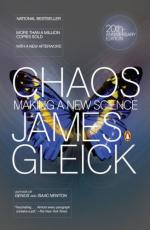|
This section contains 1,165 words (approx. 4 pages at 300 words per page) |

|
SOURCE: “Thinking,” in London Review of Books, August 4, 1988, pp. 14, 16.
In the following excerpt, Campbell offers a positive assessment of Chaos.
. … James Gleick's Chaos tells an exhilarating tale. It starts a quarter of a century ago with work on weather forecasting by Edward Lorenz and finishes with an account of the penetration of ‘chaos’ research into sciences as different as epidemiology and astronomy. Science has traditionally turned a blind eye when a graph fluttered unmanageably and thus the future could not be plotted on a straight line or a smooth curve. It is such non-linear phenomena which chaos research investigates.
‘Chaos’, as it is used in this context, is confusing. It is not, for instance, a synonym for ‘random’. Weather is chaotic: you never know exactly when the next cyclone will come across the Atlantic—but it is not random. The behaviour of warm damp air, on any scale...
|
This section contains 1,165 words (approx. 4 pages at 300 words per page) |

|


